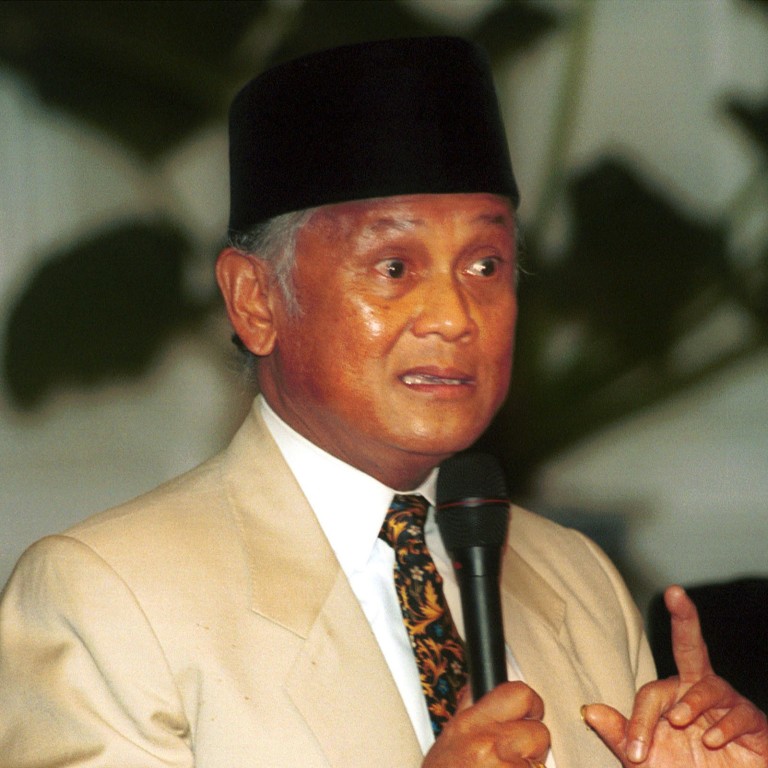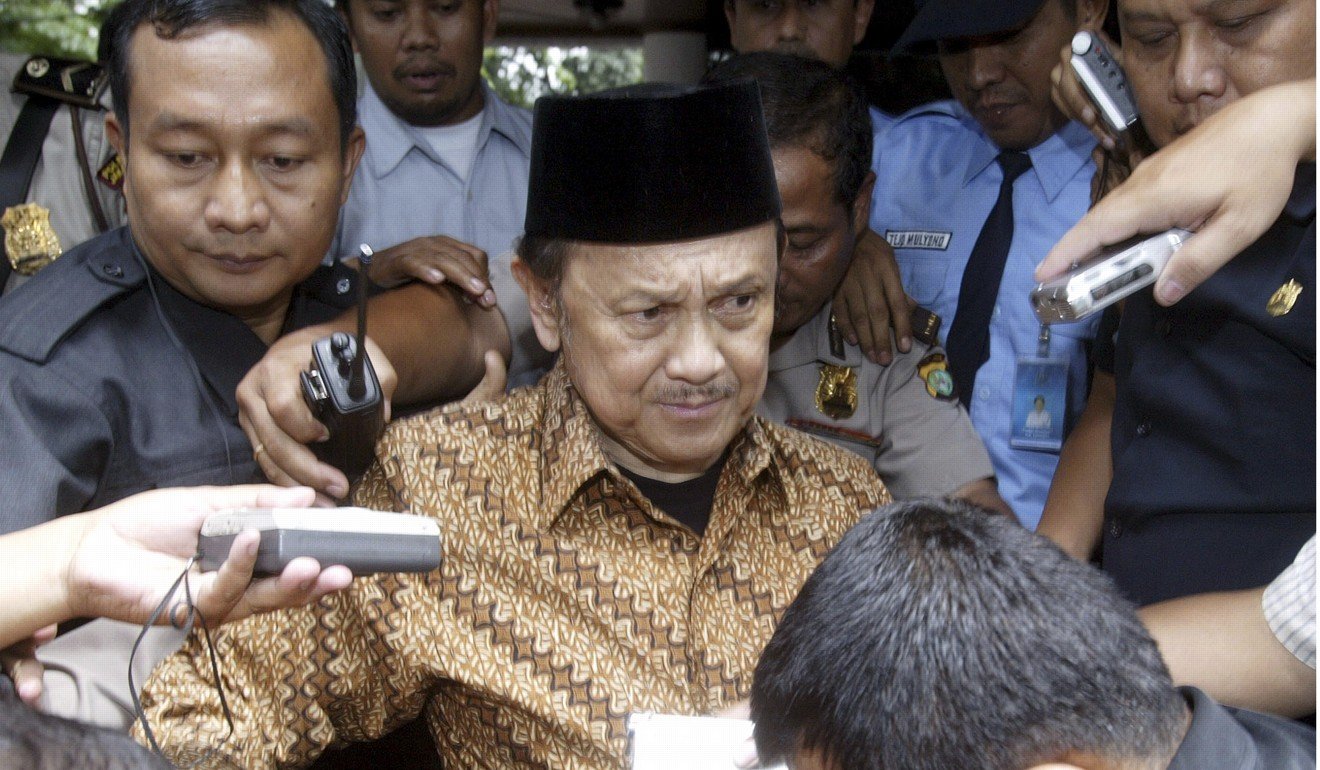
Former Indonesian president B.J. Habibie remembered for sweeping changes, after his death at age 83
- The aeronautical engineer stepped in as Indonesia’s leader after the fall of strongman Suharto and ruled the country briefly in 1998 and 1999
- He was credited with kick-starting reforms that put Indonesia on the path to democracy, and entered business after leaving politics
Former Indonesian president B.J. Habibie died on Wednesday at a hospital in Jakarta, aged 83, after spending more than a week in intensive care.
He was Indonesia’s third president after independence, leading the country in 1998 and 1999 after strongman Suharto was forced to step down amid widespread protests and civil strife.
In a condolence message, current President Joko “Jokowi” Widodo called Habibie a “model of a statesman in our life”, saying he frequently contributed solutions to the country’s problems.
Habibie was known as a brilliant scientist who trained in Germany as an aeronautical engineer, and he had grand plans to turn Indonesia into an industrial and technological powerhouse. He was credited with kick-starting reforms that put Indonesia on the path to becoming a democracy.
Former Indonesian president Habibie hopes seafront flats in Batam mega city will lure Singapore’s cashed-up buyers
After leaving politics, he went into business, most recently launching a billion-dollar residential and commercial project on the Indonesian island of Batam to help revive its economy.
Habibie is best known among Singaporeans for once describing the city state as a “little red dot” in the aftermath of the 1997 Asian financial crisis. He made the assertion during a media interview in which he also said Singapore was not a friend of Indonesia but for Jakarta it was not an issue as his country was much larger than the city state.
Singapore’s then prime minister Goh Chok Tong responded in his annual policy speech later that month by saying the Lion City would help Indonesia “within the limits of our ability”.
“We are not in the same class. After all, we are only 3 million people – just a little red dot on the map. Where is the capacity to help 211 million people?” Goh said, referring to Indonesia’s population at the time.
Since then, Singaporeans have adopted the term as a motto and used it to describe, with pride, how their country has punched above its weight in many instances.
Bilahari Kausikan, a former permanent secretary at Singapore’s foreign ministry, said: “Singaporeans owe him a great debt. He coined the phrase ‘little red dot’. He meant it as an insult, but we turned it into a badge of honour.”

Habibie’s unpopular presidency was the shortest in modern Indonesia’s history but was transformative. He was in office for less than two years and will be remembered for stabilising his nation’s currency during the financial crisis and ordering a referendum on East Timor’s independence.
“I, on behalf of the people of Indonesia and the government, would like to express my deep sorrow for the passing of Professor B.J. Habibie,” Widodo said.
“Mr Habibie was a world-class scientist, the father of Indonesian technological advancement and the third president of Indonesia.”
He was a humble man, with lengthy and intelligent discourse, and he was no ordinary politician
Other leaders also paid tribute.
“He is my good friend, so I feel very sad. He must have been very sick; I haven’t seen him in a long time. I offer my condolences to his family,” Malaysian Prime Minister Mahathir Mohamad was quoted as saying by The Star.
People’s Justice Party leader Anwar Ibrahim wrote on Facebook: “He was a humble man, with lengthy and intelligent discourse, and he was no ordinary politician.”
Australian Prime Minister Scott Morrison tweeted: “Deepest condolences on the passing of Indonesia’s third president, B.J. Habibie. He led the Republic of Indonesia at a time of massive change. His courage and vision during the period of reformasi were appreciated in Australia. Our thoughts are with his family and loved ones.”
Chinese migrants in East Timor long for home but say Dili is better for earning a living
Habibie spent nearly two decades working for German aircraft maker Messerschmitt-Boelkow-Blohm, before returning to Indonesia in 1974 to help lead Suharto’s campaign to industrialise the economy.
As president, Habibie apologised for past human rights abuses and outlined an eight-point reform programme “to build a just, open and democratic society”.
He ordered the release of political prisoners, dismantled restrictions on the press and reformed politics to allow for free elections.
He lifted a three-decade-old ban on the speaking and teaching of Mandarin as part of an easing of discriminatory policies against ethnic Chinese that was instituted by Suharto after his anti-communist pogroms of 1965 and 1966.
Responding to international criticism of Indonesia’s occupation of Portugal’s former colony of East Timor, Habibie surprised Indonesians by announcing in January 1999 a plan to hold a referendum on self-determination under United Nations supervision, offering a choice between special autonomy and independence.

Indonesian militias deployed terror tactics to intimidate people into voting for continued union, but East Timorese voted overwhelmingly to split from Indonesia.
Despite his reforms, Habibie was unable to master the political tumult unleashed by the student uprising that ousted Suharto.
He described the bloody riots as “barbaric”, further alienating students who feared he was betraying their democratic revolution.
A failure to prosecute a long-time friend over allegations of massive corruption undermined his campaign to stay in power. In October 1999 Habibie withdrew from upcoming presidential elections.
Parliament was already moving to elect a new head of state after lawmakers rejected his “accountability” speech on the successes and failures of his months in office.
Born on June 25, 1936, in the South Sulawesi town of Parepare, Habibie was the fourth of eight siblings.
His father was of native Sulawesi descent and his mother a Javanese noblewoman from the ancient sultanate of Yogyakarta. His wife, Hasri Ainun Habibie, a medical doctor, died in 2010.
Habibie had been receiving treatment for a heart ailment before his death.
